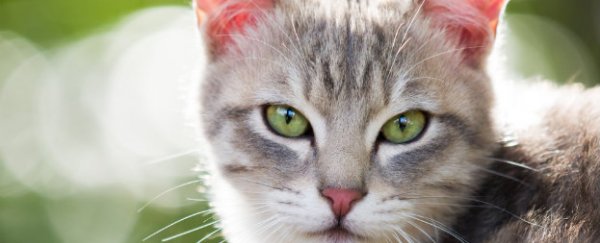Your cat may be one of your best friends, but how much do you really know about its heritage? Cats and humans have shared the same households for the past 9,000 years, but this is nothing compared to the 30,000 years that dogs have been domesticated. With much less information to go on, it's so far been very difficult for scientists to figure out the genetic roots that separate your feline friend from their wild relatives.
In an attempt to find out what makes cats want to cuddle with you on the couch instead of trying to eat you, researchers from Washington University School of Medicine in the US have analysed the genomes of domesticated cats and wildcats to discover just how different certain genes have become. The wildcat (Felix silvestris) is the ancestor of the domestic cat, and subspecies are found in Europe, Africa, and West to Central Asia.
To identify these genes, the team first sequenced the genome of a domestic female Abyssinian, and compared it to the genomes of six other domestic cat breeds and two wildcat subspecies.
The results published in the Proceedings of the National Academy of Sciences, identified 13 important genes that have changed as cats morphed from feral to friendly. Some of these genes are involved in cognition and motivation, including the ability to learn new behaviours when offered rewards, which is an important part of the domestication process.
The researchers also uncovered 281 other genes that are responsible for the various differences between the physiology of domestic cats and wildcats. Some of these genes influence fat metabolism, which the team suggests is how domestic cats have adapted to a less carnivorous lifestyle than wildcats.
The team also compared the domestic cat genome with those of other mammals including dogs, cows and humans.
Compared to dogs, cats have several more copies of genes to detect sex hormones, which enables them to monitor their social environment. This ability is not as important for dogs, as they tend to travel in packs. Interestingly, dogs had more copies of the genes for smell receptors than cats, which contributes to their incredible sense of smell.
"The study is great, especially in defining changes in the genome that have led to domestication or, more correctly, to the adaptation of the ancestors of domestic cats that allowed them to associate with humans and thus gain both protection from their predators and an ample food supply (rodents)," Niels Pederson, a veterinary researcher at the University of California in the US who was not involved in the study, told Tia Ghose from Live Science.
The research is the first evidence for the evolutionary history of cats and the team now hopes to analyse specific genomic regions to see how they impact the behaviour of our feline friends.
